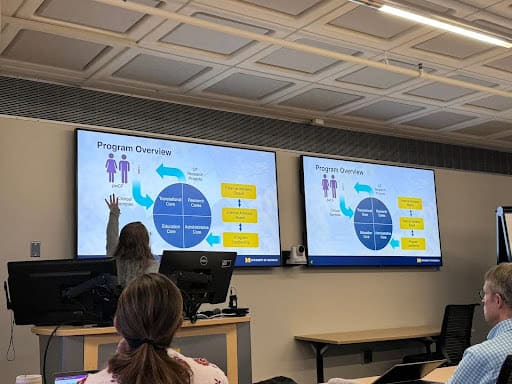
Building Community Around Cystic Fibrosis Research at U-M
The CF initiative has drawn participants from nine different units across campus, highlighting U-M’s strength in both engineering and medicine.

The CF initiative has drawn participants from nine different units across campus, highlighting U-M’s strength in both engineering and medicine.
Representatives from the Cystic Fibrosis Foundation (CFF) recently visited U-M to review progress toward establishing a CF research community at U-M and to help U-M investigators prepare for a larger center grant submission to the foundation in February 2026. This visit was a follow up to a $500K Program Development Award the U-M CF team currently has from the CFF, which was awarded last August. The award is intended to support the development of a CF basic research community and encourage interdisciplinary collaborations.
Alex Piotrowski-Daspit, Assistant Professor, Biomedical Engineering and Internal Medicine—Pulmonary & Critical Care Medicine, is the principal investigator on the award and noted the strides being made in CF research. The $500K award, which provides for $250,000 in direct costs annually for two years, is being put to vital use. “It includes funds for community events, an annual retreat, a seminar series, and seed funding for pilot experiments,” she said. The visit from the CFF was a testament to the rapid progress U-M has made since the award’s inception in August.
“We’ve started a “CF at UM” seminar series and had an initial round of seed-funding applications, which supported several interdisciplinary U-M faculty collaborations,” Dr. Piotrowski-Daspit said. “We’ve funded five awardees who presented their progress during the visit”:
The CF initiative has drawn participants from nine different units across campus, highlighting U-M’s strength in both engineering and medicine. The cross-campus collaboration underscores the university’s unique capability to lead a project uniting a variety of research specialities.
The CFF representatives “were impressed by how much we’ve done in such a short time,” Dr. Piotrowski-Daspit said. Meeting presenters included experts from the U-M Pediatric CF Center, U-M Pediatric Pulmonology, U-M Adult Pulmonary & Critical Care Division, and U-M Adult CF Clinic, as well as U-M Innovation Partnerships.
The more extensive grant submission to the foundation will support U-M’s CF research community’s ultimate goal: to be part of what the CFF terms their research development program—a broader initiative supporting facilities and infrastructure.
“I am excited about this initiative because it really aligns well with my professional and research goals,” Dr. Piotrowski-Daspit said. “My lab is focused on developing delivery vehicles for different CF therapies. We have another CFFgrant that highlights U-M’s unique strengths—a collaboration with Michelle Hastings, Pfizer Upjohn Research Professor, Pharmacology & Medicinal Chemistry, Director, M-RNA Therapeutics, and Rachel Niederer, Assistant Professor, Biological Chemistry—focused on novel RNA therapeutics.”
Looking forward, Dr. Piotrowski-Daspit envisions an education core aimed at supporting trainees in the field. “We’re offering travel awards to the North American Cystic Fibrosis Conference and planning professional development opportunities,” she noted. “Traveling to conferences is always a great opportunity for trainees to showcase their research, receive feedback, and expand their professional networks. We also anticipate developing technical training resources for experimental assays related to CF research. Our immediate goal is to establish a website, within the U-M framework, to serve as a central resource for collaboration.” To demonstrate the institutional synergies, Dr. Piotrowski-Daspit noted that an early open-house event drew over 30 faculty members, including center directors and other leadership, to brainstorm future directions.
“The gene for CF was actually discovered here at Michigan by Francis Collins, MD, Ph.D., (a former Director of the National Human Genome Research Institute and a former Director of the National Institutes of Health). Bringing this CF initiative and basic research community back to U-M really helps us come full circle,” Dr. Piotrowski-Daspit noted.
“This CF initiative is a great opportunity for U-M, and we’re looking to expanding and including more members of the U-M BME community into our work,” she added. “We already have more than 30 U-M faculty members who are part of this initiative and who are enthusiastic about our potential for growth.”